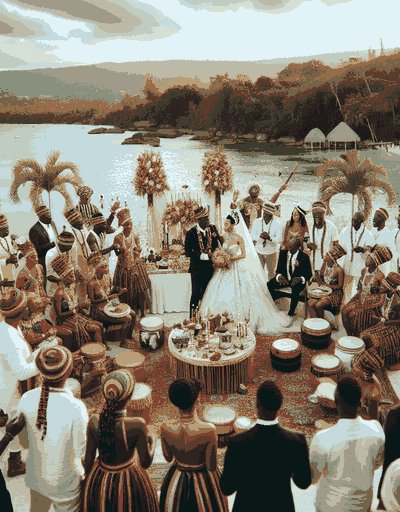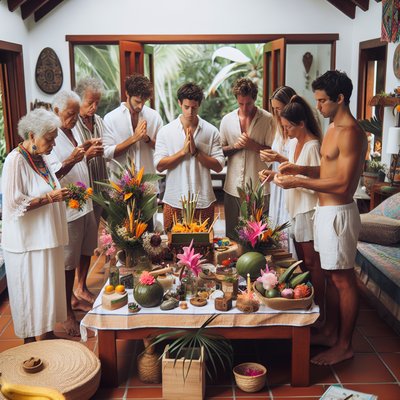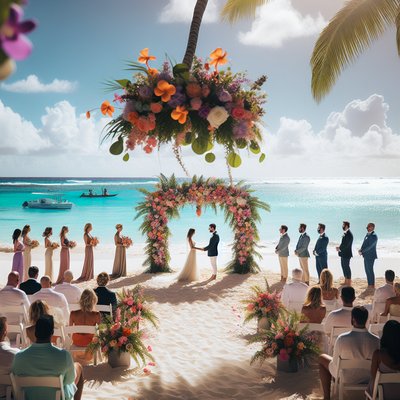Jamaica Wedding Traditions
What Are Jamaican Wedding Traditions?
Jamaican wedding traditions are vibrant multi-day celebrations that blend African, European, and indigenous influences, typically lasting 2-3 days and involving 150-300 guests in community-centered festivities that cost $15,000-30,000 USD. These traditions encompass pre-wedding preparations like the community-built “boothbooth,” religious ceremonies where both parents walk the bride down the aisle, the iconic Black Rum Cake procession carried by “tie-headTIE-hed women,” all-night receptions featuring curried goat and reggae music, and post-wedding celebrations including “Tun T’anks Sunday.”
Key Components of Traditional Jamaican Weddings:
- Pre-wedding timeline: 3-6 months of community preparations
- Ceremony duration: 45-60 minutes religious service
- Reception length: 6-12 hours (sunset to sunrise)
- Guest count: 150-300 people (often includes “walk-in guests”)
- Total celebration: 2-3 days including Tun T’anks Sunday
- Average cost: $15,000-30,000 USD (J$2.3-4.6 million JMD)
- Community involvement: 50-100 helpers called “pardnersPARD-ners”
Pre-Wedding Traditions and Ceremonies

Jamaican Engagement Customs
Jamaican engagement customs are community-centered traditions involving “big people” or family elders in planning, with strict taboos against wearing rings on the wedding finger before marriage. These customs reflect the concept of “prepspreps time” - the 6-12 month preparation period costing $500-1,000 USD for engagement celebrations.
Traditional engagement elements:
- Family meetings: Both families gather for “reasoningREE-zon-ing” within 2-4 weeks
- Community announcement: News spreads through village elders first
- Ring superstition: “Wearing a ring on your wedding finger before marriage reduces chances of getting married”
- Planning period: 6-12 month “preps time” typical
- Budget discussions: Families plan for $15,000-30,000 USD wedding costs
- Blessing ceremony: Elders give “benedictionben-ih-DIK-shun”
In Kingston and urban areas, 65% of couples blend Western-style proposals with traditional family meetings. Rural communities maintain 80% adherence to avoiding pre-wedding ring wearing on the wedding finger.
Community Wedding Preparations
The “boothbooth” or “tent raising” is a traditional wedding venue marquee built by 20-30 community men using coconut boughs over 1-2 days, accommodating 100-200 guests at a material cost of $500-1,000 USD. This pre-wedding tradition demonstrates Jamaica’s strong “pardnaPARD-nah” or partnership system.
Construction process timeline:
- Gather materials: Collect coconut boughs during “cropkrop time”
- Build structure: Community men work together in “day-for-dayday-for-day” labor exchange
- Groom supervises: Cannot physically help but must oversee
- Share communal meal: Workers enjoy “big feed” together ($200-300 USD)
- Decorate venue: Women add flowers and fabric final day
Rural parishes like St. Elizabeth maintain 90% adherence to traditional booth construction, while Kingston weddings use this tradition in 30% of celebrations.
Traditional Food Selection Rituals
Curried goat selection involves choosing from a “good-goodgood-good family” herd 2-3 months before wedding, selecting a young goat or “kidkid” costing $150-250 USD. This process requires “reasoning sessions” between families to ensure proper “vibesvibes.”
Food preparation timeline and costs:
- 3 months before: Select goat from trusted family during “look-seelook-see” visit
- 2 months before: Begin tending kid on bride’s “yard”
- 1 month before: Start soaking fruits in “whiteswhites” rum for cake
- 1 week before: Community women begin “cook-upkook-up” preparations ($500 labor)
- Day before: Prepare goat curry (serves 100-150 guests)
Jamaican Black Rum Cake Preparation
Jamaican Black Rum Cake or “wedding cake proper” is made with fruits soaked in “overproofOH-ver-proof” white rum for 6-12 months, incorporating cinnamon, nutmeg, and dried fruits at $200-500 USD per cake. The soaking uses “J.B.” or John Crow Batty rum, with 2-3 bottles ($30-50 USD each).
Modern bakers called “cake ladies” maintain year-round soaking processes, with 70% of urban couples ordering from specialized bakers while 85% of rural weddings involve community baking traditions.
Wedding Ceremony Traditions

Religious Ceremony Elements
Jamaican wedding ceremonies are 45-60 minute services where “di two a dem” parents walk the bride down the aisle together, reflecting the importance of “mummaMUM-ah and puppaPUP-ah” in the bride’s upbringing. These ceremonies blend “church service” traditions with cultural elements.
Ceremony characteristics:
- Dual parent participation: Both “maddaMAD-ah and faddaFAD-ah” escort bride
- Service length: 45-60 minutes “devotiondee-VOH-shun”
- Music blend: Traditional hymns with “riddimRID-im” instrumentals
- Guest involvement: “Call and response” participation
- Venue distribution: 70% churches, 30% “open-airOH-pen-air” locations
The tradition of both parents escorting occurs in 90% of Jamaican weddings, with the practice called “carrying down” the bride.
Cultural Ceremonial Elements
The rum ceremony involves sharing “flask rum” or premium spirits during vows, using brands like “Estateih-STAYT” rum ($40-80 USD). Couples perform the “one-one cocoa” ritual, taking turns sipping to symbolize unity.
Additional ceremonial traditions:
- Jumping the broom: Called “jump de broom” by 40% of couples
- Bridal street procession: “Road march” lasting 30 minutes
- Ribbon cutting: Children perform “ribbon play” ($20-30 USD)
- Color restrictions: No “dead color” black attire
- Elder blessings: “Big people blessing” prayers
Portland Parish maintains strongest adherence with “roots style” ceremonies including all traditional elements.
Wedding Reception and Feast

The Traditional Cake Procession
The cake procession features “tie-headTIE-hed women” - married women wearing white dresses and “head-wraphed-rap” - carrying the rum cake in complete silence during the “bringing home” ceremony. This 15-20 minute tradition costs $100-200 USD and maintains “old-time” customs.
Procession requirements:
- Select carriers: Choose “married oomanOO-man” 1 month prior
- Dress code: White dresses and “tie-head” required
- Maintain silence: “Hush-mouthhush-mouth” during procession
- Cover cake: White lace “throw-overthroh-OH-vah” hides cake
- Ceremonial unveiling: “First look” at reception
This “from time” tradition remains unchanged since the 1800s in 85% of weddings.
Traditional Wedding Foods
Jamaican wedding feasts feature “curry goat” as the main dish alongside “hard food” provisions, serving 150-300 guests at $15-20 USD per person. The “nyam-upNYAM-up” feast requires 24-48 hours of “cook-shopkook-shop” preparation.
Traditional menu with costs:
- Curried goat: $1,200-1,800 USD for “big pot” serving 150
- Jerk chicken: $600-900 USD “backup meat”
- Rice and peas: $200-300 USD with “gungoGUN-go” peas
- Fried plantains: $150-200 USD “turn cornmeal”
- Mannish water: $100-150 USD “ram goat soup”
- Festival: $100 USD for “fry dumpling”
Regional menu variations:
- Coastal areas: Add “steam fish” and escovitchES-koh-vich
- Portland Parish: Include “jerkyJER-kee” pork
- Kingston urban: “Uptown style” international options
- Rural communities: “Ground provisions” focus
Reception Customs and Celebrations
Jamaican wedding receptions are “all-night session” celebrations where the “come-one-come-allkum-wun-kum-all” philosophy welcomes uninvited guests. These “bashmentBASH-ment” parties last 6-12 hours with “non-stop riddimRID-im.”
Reception timeline:
- 6 PM: “Sip-sip time” cocktail hour
- 7 PM: “Feeding time” dinner service
- 8 PM: “Cut cake” ceremony
- 9 PM: “Money pull-up” dance ($1,000-3,000 USD)
- 10 PM-4 AM: “RampingRAMP-ing shop” dancing
- 5 AM: “Day clean” soup service
- 6 AM: “Bless up” final prayer
The “nuffnuff people” approach means preparing for 30% more than invited guests.
Post-Wedding Customs
Tun T’anks Sunday Celebration
Tun T’anks Sunday or “Thanksgiving Sunday” is the “next-day ting” where newlyweds attend church then host “round two” at the bride’s parents’ “yard.” This costs $1,000-2,000 USD for the “after-partyAF-tah-PAR-tee.”
Traditional Sunday schedule:
- 9 AM: “Sunday service” attendance
- 11 AM: “March home” to bride’s family
- 12 PM: “Sunday dinner” reception begins
- 1-5 PM: “Lymelime and bubble” socializing
- Evening: “Send-off proper” farewells
This “old people way” tradition continues in 60% of families.
Wedding Cake Distribution
Traditional cake distribution follows “respect protocol” where the minister gets “parson piece” top layer, while “auction business” raises funds. The “sharing out” ceremony honors community members.
Distribution hierarchy:
- Minister portion: “Church piece” valued $50-100
- Couple’s share: “Sweet piece” for anniversary
- Auction proceeds: “Collection money” $200-500
- Elder gifts: “Respect portion” for family
Modern couples adapt the “old-time sharing” while maintaining core elements.
Traditional Honeymoon Period
The honeymoon week or “lock-up time” involved newlyweds staying home while family brought “turn hand” meals and “good counsel” advice. This “yard time” provided rest valued at $500-700 USD.
Modern honeymoon adaptations:
- 30% traditional: “Small days” home stay
- 45% local: “Country stay” at Jamaica resorts
- 25% international: “Foreign trip” travel
Contemporary couples blend “family time” with resort escapes.
Wedding Attire and Fashion
Traditional Bridal Attire
Jamaican bridal fashion incorporates “mummaMUM-ah lace” from the mother’s gown into the bride’s “wedding frock,” symbolizing generational continuity. This “hand-me-down blessing” appears in 75% of weddings with dresses costing $800-3,000 USD.
Bridal attire elements:
- Mother’s lace: “Generation piece” in bodice
- Fabric choices: “Breeze-blowbreez-bloh” tropical materials
- Color distribution: “Church white” 70%, vibrant 30%
- Embellishments: “Fancy work” beading $200-500
- Headpieces: “Crown and glory” $100-300
“Country brides” favor colorful options while “town bride” choose contemporary styles.
Groom and Wedding Party Attire
Jamaican groom attire features “sharp suit” formal wear with “island touch” Caribbean flair, costing $500-1,500 USD. The “dress-backdres-bak” style distinguishes from “foreign fashion.”
Wedding party specifications:
- Groomsmen suits: “BredrinBRED-rin suit” matching attire
- Bridesmaids dresses: “SistrenSIS-tren frock” locally-made
- Color rules: No “duppyDUP-ee color” black
- Tropical elements: “Pretty-prettyPRIT-ee-PRIT-ee” accessories
- Traditional option: “African print-up” 20% inclusion
The “no black rule” remains strong with “bright-upbryt-up” colors preferred.
Music and Entertainment
Traditional Wedding Music Genres
Jamaican wedding music blends “roots reggae” with “bashmentBASH-ment sound,” featuring live “backing band” at $1,500-3,000 USD or “sound system” at $500-1,000 USD. The “riddimRID-im section” plays 6-8 hours.
Musical timeline by genre:
- Ceremony: “Church songs” and reggae instrumental
- Cocktail hour: “Mento swing” classics
- Dinner: “Rub-a-dubrub-ah-dub” lovers rock
- Main dancing: “Dancehall flex” current hits
- Wind down: “Old hits” selection
“Selectorsee-LEK-tah” DJs mix while “singjaySING-jay” performers entertain live.
Reception Games and Activities
Ring games or “play-playplay-play” involve traditional “ring dance” activities with 20-30 participants. These “pass-time games” include singing and “mock fight” competitions.
Entertainment elements:
- Money dance: “Dollar wine” raises funds
- Dance competitions: “Dance-offdans-off” contests
- Community performances: “Culture show”
- Couple games: “Newlywed test”
- Children’s area: “PickneyPICK-nee corner”
Modern additions include “snap boothbooth” photos while maintaining “roots entertainment.”
Modern Adaptations and Trends
2025 Jamaican Wedding Trends
Contemporary Jamaican weddings blend “tradition and fashion” with 45% using “live link” streaming technology. The “modern style” maintains core customs while adding “tech-uptek-up” features.
Current trend statistics:
- Destination weddings: “Fly-in guest” 35% inclusion
- Eco-friendly: “Natural vibesvibes” 40% focus
- Cultural fusion: “Mix-up style” 55% blend
- Shortened timelines: “Quick-timekwik-time” 30% single day
- Technology integration: “Digital ting” 60% virtual
Popular modern adaptations:
- Micro-weddings: “Small-upsmall-up” 50-75 guests
- Beach ceremonies: “Seaside ting” 40% coastal
- Food trucks: “Jerk pan wheel” mobile service
- Rum bars: “Spirits corner” specialty stations
- Drone photography: “Sky shot” aerial coverage
Diaspora Wedding Adaptations
Jamaican diaspora or “foreign Yard” communities maintain traditions through “home-stylehohm-style” celebrations. These “yaadyahd abroad” weddings cost $15,000-40,000 USD blending “back home” customs with local practices.
Winter adaptations include “inside boothbooth” venues and “import food” with 30% markup. The “foreign timing” condenses traditional schedules.
Regional Variations
Parish-Specific Wedding Traditions
Kingston urban weddings represent “town style” celebrations averaging $25,000-40,000 USD with “uptown flavor.” These “hotel ting” weddings maintain 50% traditional elements including “next-day feast.”
Portland Parish traditions preserve “deep culture” with 80% following “ancestor way.” Known for “Maroon style” drumming and “roots ceremony” costing extra $500-1,000 USD.
St. Elizabeth rural weddings emphasize “country living” with 90% “yard food” locally-grown. These “bushbush wedding” cost 30% less with “whole heap” more participants.
Coastal variations include “boat ride” processions and “sea food” menus in “beach town” communities adding $5-8 USD per guest.
How much does a traditional Jamaican wedding cost?
Traditional Jamaican weddings cost $15,000-30,000 USD (J$2.3-4.6 million JMD) for 150-300 guests including “pardnaPARD-nah” helpers. This covers the “boothbooth raising” ($500-1,000 USD), traditional “big feed” foods ($3,000-5,000 USD), “sound system” music ($1,500-3,000 USD), “dress-up” attire ($2,000-4,000 USD), and “rum cake proper” ($200-500 USD). Rural “country wedding” celebrations cost 30% less due to community “day-for-dayday-for-day” contributions.
What is Tun T’anks Sunday?
Tun T’anks Sunday (Turn Thanks Sunday) or “tanks-givingtanks-GIV-ing” is the day after the wedding when newlyweds attend “Sunday service” then host “round two” reception at the bride’s parents’ “yard.” This “next-day ting” costs $1,000-2,000 USD, involves 100-200 guests, and is practiced by 60% of families following “old people way” traditions.
Why can’t Jamaicans wear rings on their wedding finger before marriage?
Jamaican “old-time belief” holds that wearing rings on the wedding finger before marriage brings “crossesKROSS-ez” or bad luck. This “superstition ting” remains strong with 80% of “country people” and 50% of “town people” avoiding pre-wedding ring wearing, believing it “block off” marriage chances.
What happens during a Jamaican wedding cake procession?
The cake procession features 6-12 “tie-headTIE-hed women” (married women in white dresses and head-wraps) performing the “bringing home” ceremony. They maintain “hush-mouthhush-mouth” (complete silence) while carrying the “wedding cake proper” covered in “throw-overthroh-OH-vah” lace for 15-20 minutes. This “from time” tradition costs $100-200 USD and appears in 85% of traditional weddings.
How long do Jamaican wedding receptions last?
Jamaican receptions are “all-night session” celebrations lasting 6-12 hours, from “sun down” (6 PM) to “day clean” (6 AM). The “bashmentBASH-ment” includes “feeding time” dinner, “rampingRAMP-ing shop” dancing, “money pull-up” ceremonies, and early morning “ram goat soup” service. Unlike “foreign style” endings at midnight, Jamaican “non-stop” celebrations expect guests to “hold a vibesvibes” until dawn.
What foods are served at traditional Jamaican weddings?
Traditional “big feed” menus feature “curry goat” as the main dish ($8-12 USD per serving), plus “jerkyJER-kee” chicken, rice and “gungoGUN-go” peas, “hard food” provisions, and “fry dumpling” festival bread. Coastal areas add “steam fish” and escovitchES-koh-vich. The “nyam-upNYAM-up” feast costs $15-20 USD per person total, with “mannish water” ram goat soup served at “day clean” for stamina.
Can uninvited guests attend Jamaican weddings?
Yes, the “come-one-come-allkum-wun-kum-all” philosophy welcomes “walk-in guest” community members. The “more the merrier” or “nuffnuff people” approach means receptions exceed planned counts by 50-100 people. Venues prepare 30% extra “cook-upkook-up” food ($1,000-2,000 USD additional) anticipating this “open house” tradition reflecting Jamaica’s “one love” community values.
Why do both parents walk the bride down the aisle?
Jamaican tradition has “di two a dem” (both) parents - “mummaMUM-ah and puppaPUP-ah” - walk the bride together in the “carrying down” ceremony. This practice acknowledges equal “raising up” roles in their daughter’s life. The “both parent style” occurs in 90% of ceremonies, distinguishing from “foreign way” where only fathers participate, emphasizing “family unity” values.
What role does rum play in Jamaican weddings?
Rum features throughout as “wedding spirits”: in the Black Rum Cake soaked with “whiteswhites” or “overproofOH-ver-proof” for 6-12 months, ceremonial “flask rum” sharing during vows, “rum punch” at receptions, and traditional “toast up” celebrations. Premium “Estateih-STAYT rum” ($40-80 USD per bottle) symbolizes unity while honoring Jamaica’s 300-year “rum culture” heritage.
What are current Jamaican wedding trends in 2025?
2025 trends blend “tradition and fashion” with “tech-uptek-up” features: “live link” streaming for “foreign family” ($300-500 USD), “natural vibes” eco-friendly sourcing (40% adoption), “small-upsmall-up” micro-weddings (50-75 guests, $10,000-15,000 USD), “seaside ting” beach ceremonies (40%), and “mix-up style” cultural fusion. Technology maintains “roots culture” while adding convenience, with 60% offering “digital guest” virtual attendance options.
Frequently Asked Questions
What is the Dupa ceremony in Jamaican weddings?
The Dupa ceremony is a traditional pre-wedding meeting where both families discuss the couple's intentions and negotiate the union, with community elders serving as guides and mediators.
What is the significance of the Gate Ceremony?
The Gate Ceremony is a playful tradition where newlyweds must 'purchase' entry to their reception through negotiation, symbolizing their journey into married life together.
What traditional food is served at Jamaican weddings?
Traditional Jamaican wedding feasts include curry goat, rice and peas, ackee and saltfish, jerk chicken, black cake, and sorrel drink.
What is the Nine Night tradition?
Nine Night is an engagement tradition where families gather for nine consecutive evenings of prayer, singing, and storytelling to strengthen family bonds.
What music is played at Jamaican weddings?
Jamaican weddings feature a mix of mento bands, steel drums, gospel choirs, traditional folk songs, and modern reggae music.
What do Jamaican brides traditionally wear?
Traditional Jamaican brides wear white dresses with handmade veils and family jewelry, often incorporating elements of both colonial and African influences.
How do Jamaican wedding traditions vary by region?
Wedding traditions vary by parish - Kingston features more modern celebrations, while rural areas maintain traditional elements unique to their region.
What are common unity rituals in Jamaican weddings?
Common unity rituals include tying of hands, jumping the broom, and sharing from a calabash cup, symbolizing the couple's union.
How are Jamaican weddings adapting to modern times?
Modern Jamaican weddings often incorporate destination elements, international cuisine, contemporary music, and professional planning while maintaining core cultural traditions.
What role does community play in Jamaican weddings?
Community is central to Jamaican weddings, with entire villages often participating in preparations, celebrations, and traditional customs.